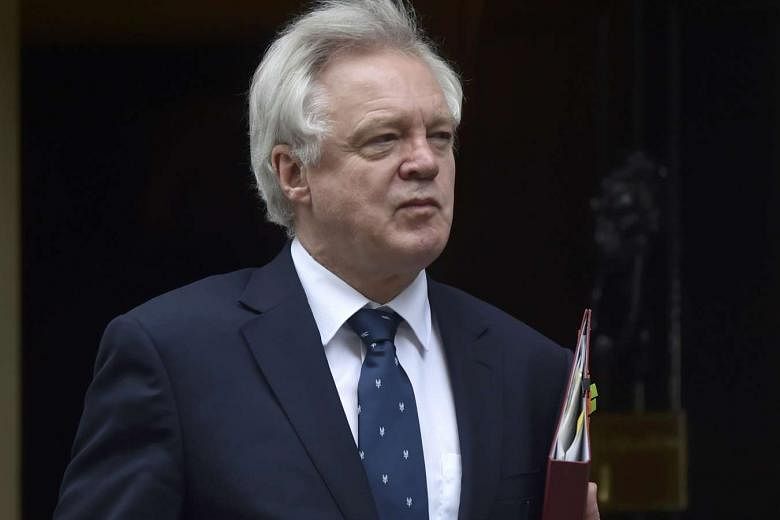LONDON (AFP) - Britain sought to downplay a row over future security ties with the EU on Thursday (March 30), as London and Brussels drew up the first battle lines at the start of their two-year divorce.
France and Germany also put up a common front against Prime Minister Theresa May's call to negotiate the exit and the new relationship at the same time, setting up a major stumbling block before negotiations even begin.
But a day after May formally notified the EU of Britain's intention to leave, it was her warning that failure to clinch a deal on trade would weaken the fight against terrorism that rankled.
"It's not a threat," Brexit minister David Davis told BBC radio after warnings from Brussels against using security as a bargaining chip in the talks.
He said the "simple truth" was that without a "parallel deal" with the EU, Britain would no longer be a member of the Europol crime-fighting agency or take part in the European Arrest Warrant system.
Interior minister Amber Rudd said: "If we left Europol, then we would take our information... with us".
Guy Verhofstadt, the European Parliament's chief Brexit negotiator, hit back saying that "citizens' security was far too serious a subject" to be held hostage to negotiations.
EXIT DEAL FIRST
The row came as some of the EU's top leaders fleshed out their strategy for the hard talks ahead as the bloc reels from the blow of one of its biggest members becoming the first state ever to start withdrawal from the 60-year-old union.
French President Francois Hollande on Thursday followed German Chancellor Angela Merkel in snubbing May's proposed structure for the negotiations, saying the exit agreement should come first.
"First we must begin discussions on the modalities of the withdrawal, especially on the rights of citizens and the obligations arising from the commitments that the United Kingdom has made," Hollande said.
The fate of three million EU citizens living in Britain and one million British people within the bloc's nations is at the top of leaders' agenda.
Also looming large is the so-called "exit bill" Britain will have to pay, estimated to be as much as 60 billion euros (S$89.9 billion).
In the first business fall-out since May's Brexit notification, the prestigious Lloyd's of London insurance market said it would open a new Brussels subsidiary to ensure smooth operations in the EU.
Several banks have announced plans to increase their operations in continental Europe as a safeguard once Britain leaves the single market.
Before the talks can even get under way, the government outlined plans for the daunting task of bringing some 19,000 items of EU regulation into British law on the day that Britain leaves the EU.
Davis told parliament that the Great Repeal Bill, which would also scrap Britain's EU membership enshrined in the 1972 European Communities Act, was necessary for a "smooth and orderly exit".
He said the bill would "end the supremacy of European law" in Britain but added that case law from the European Court of Justice would continue to be used by British courts, which would be ruling on "EU-derived law".
Davis said the government also proposed to use extraordinary powers - referred to by commentators as "Henry VIII powers" in reference to the 16th-century English king who introduced them - to amend thousands of EU regulations that were not compatible with British law.
EU RESPONSE
A first response from the EU to Britain handing in its notice will come from Tusk on Friday when he issues draft "negotiating guidelines".
Leaders of the 27 remaining EU countries will hold a special summit on April 29 to rubber stamp the plans.
While the bloc has tried to show a united front in the face of Brexit, celebrating the EU's 60th anniversary earlier this month, in Britain the prime minister is struggling to unite her own country.
Britons last year voted 52 per cent to 48 per cent in favour of Brexit after a bitterly divisive campaign.
In Ireland and neighbouring Northern Ireland, a once-troubled British province, the result has also raised fears about a return of border checks and an impact on the delicate peace process.
The referendum result has also led to a renewed campaign for independence in Scotland, after a majority of Scots voted for Britain to stay in the EU in the June referendum.
"Dear Donald Tusk, We'll see EU soon" read Thursday's headline of Scotland's pro-independence newspaper, The National.











